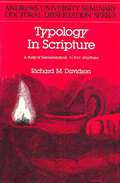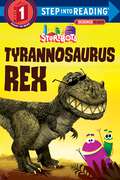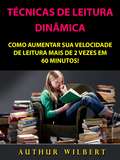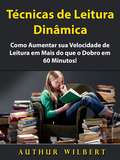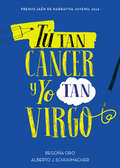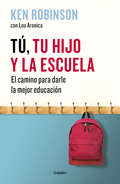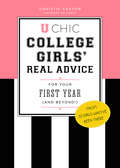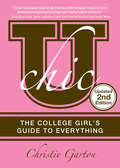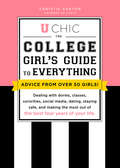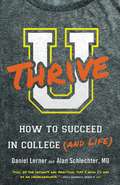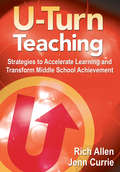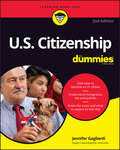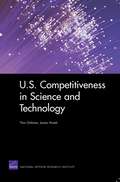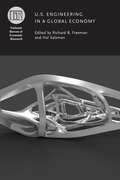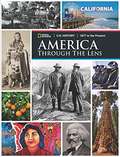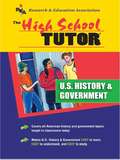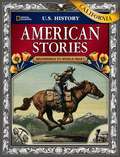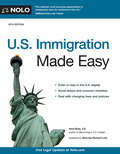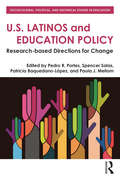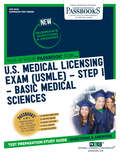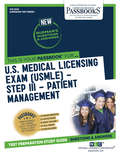- Table View
- List View
Typology in Scripture: A Study of Hermeneutical (Foreign Language) Structures
by Richard M. DavidsonNo comprehensive survey of the significant participants, views, and issues in the twentieth-century discussion of biblical typology has heretofore been conducted. In view of the proliferation of literature on typology since 1900, and the great disparity of views on a host of issues related to the topic, such a survey appears to be necessary as a preliminary step to any further investigation. In the present book we attempt to respond to this need.
Tyrannosaurus Rex (Step into Reading)
by StorybotsThe wacky robots from the award-winning apps, videos, and Netflix show, Ask the Storybots, now star in their own early readers. This one is about everyone&’s favorite dinosaur!Fans of the StoryBots will recognize the colorful art from the hugely popular dinosaur video &“Tyrannosaurus Rex&” on YouTube. A gigantic body and super-sharp teeth make the Tyrannosaurus rex the most fearsome of the dinosaurs. Just don&’t make fun of those tiny arms! This rhyming Step 1 Science Reader will entertain while imparting simple facts about the most popular carnivorous dinosaur of all. Step 1 Readers feature big type and easy words for children who know the alphabet and are eager to begin reading. Rhyme and rhythmic text paired with picture clues help children decode the story. Accolades for the StoryBots digital media: Appy Award for Best Book AppTeacher's Choice Award Editor&’s Choice—Children&’s Technology Review Family Choice Award Parents&’ Choice AwardCynopsis Kids !magination Award for best educational mobile app
Tyubchya Aat Toothpaste Shirte Tari Kashi
by Veena Prasadदररोज सकाळी ट्यूब दाबून त्यातून टूथपेस्ट बाहेर काढणं किती सोप्पं आहे नाही? पण पेस्ट ट्यूबच्या आत जाते कशी, हे तुम्हाला ठाऊक आहे का? हे गुपित उलगडलं आहे या पुस्तकात.
Técnicas De Leitura Dinâmica: Como Aumentar Sua Velocidade De Leitura Mais De 2 Vezes Em 60 Minutos!
by Arthur WilbertVocê gostaria de fazer seu trabalho e ler e-mails duas vezes mais rápido do que antes? Pense só, quanto tempo você não seria capaz de economizar… Apresentamos os segredos usados por profissionais para lerem mais rápido do que todo mundo! Com décadas de estratégias já testadas, este livro lhe mostrará a maneira mais rápida e efetiva de aumentar sua velocidade de leitura e irá deixá-la até duas vezes mais rápida em apenas algumas horas! Mas não só isso, você também será capaz de aumentar sua produtividade e ter mais tempo livre que de outra forma seria gasto em e-mails, fazendo tarefas de casa, estudando, lendo livros, lendo notícias e o que mais você desejar. Quer descobrir como pessoas com lenta compreensão de leitura aumentaram a velocidade com que liam? Você também pode aprender os segredos para alcançar isso, permitindo que você seja mais eficiente e tenha mais tempo livre. Este guia lhe ensinará técnicas comprovadas, sem o uso de equipamentos ou cursos caros. O que está incluido: - Aumente sua velocidade de leitura em mais de 2x! - Técnicas para facilitiar e agilizar a leitura. - Entenda parágrafos com apenas uma olhada! - Passos fáceis de serem seguidos. - Aprenda a ler mais rápido em 1 hora ou menos! + MUITO MAIS! Se você quer aumentar sua velocidade de leitura da melhor maneira possível, então esse livro é pra VOCÊ. → Volte ao topo da página e clique em “Adicionar o carrinho” para comprá-lo imediatamente ← Aviso: O autor e/ou detentor(es) dos direitos não alegam, prometem ou garantem a precisão, integralidade ou suficiência dos conteúdos deste livro e negam expressamente a responsabilidade por erros e omissões no conteúdo da obra. Este produto deve apenas ser utilizado como referência. Por favor, consulte um professional antes de agir de acordo com os contéudos aqui propostos.
Técnicas de Leitura Dinâmica: Como Aumentar sua Velocidade de Leitura em Mais do que o Dobro em 60 Minutos!
by Authur WilbertTécnicas de Leitura Dinâmica por Hiddenstuff Entertainment Como aumentar sua velocidade de leitura em mais do que o dobro em 60 Minutos! Leia 2x mais rápido em apenas 60 minutos Você gostaria de ser capaz de passar pelo trabalho e e-mails duas vezes mais rápido que antes? Pense apenas no tempo que você economizaria... Introduzindo os segredos que profissionais usam para ler mais rápido que todo mundo! Com décadas de estratégias testadas, este livro irá mostrar a você o modo mais rápido e efetivo de aumentar sua velocidade de leitura em 2x mais rápida em apenas algumas horas! Você aprenderá como aumentar a velocidade em apenas algumas horas. E não é só isso, você será capaz de aumentar a produtividade e liberar tempo que, de outro modo, você gastaria com e-mails, lições de casa, estudo, leitura de livros, leitura de novos artigos e praticamente todo o resto. Quer saber como pessoas com baixa compreensão de leitura aumentaram sua velocidade de leitura? Você também pode aprender os segredos de alcançar esse objetivo e permitri que você seja mais eficiente enquanto libera seu tempo. Esse guia ensinará você as técnicas provadas sem o uso de complementos ou cursos caros. O que está incluído: - Aumente sua Velocidade de Leitura em Mais de 2x! - Técnicas que Irão Fazer a Leitura Mais Fácil e Rápida - Passe por parágrafos com um olhar! - Passos simples e fáceis. - Aprenda a ler mais rápido em uma hora ou menos! + MUITO MAIS! Se você quer aumentar sua velocidade de leitura da melhor maneira possível então este livro é pra você. -->Vá para o topo da página e clique em “adicionar ao carrinho” e adquira-o imediatamente
Técnicas de Velocidad Lectora: Cómo duplicar la velocidad de lectura en ¡60 minutos!
by Arthur Wilbert¿Te gustaría ser capaz de volar entre el trabajo y los correos electrónicos dos veces más rápido que antes? Sólo piensa en el tiempo que te ahorrarías… ¡Te presentamos los secretos usados por los profesionales para leer más rápido que nadie! Con décadas de estrategias probadas, este libro digital le enseñará la manera más rápida y efectiva de aumentar su velocidad lectora dos veces más rápido ¡en unas cuantas horas! Usted aprenderá como mejorar su velocidad de lectura en tan sólo unas horas. Y no solo eso, sino que será capaz de incrementar su productividad y ganar tiempo libre que de otra manera invertiría en correos electrónicos, tareas, estudio, lectura de libros, artículos nuevos y prácticamente cualquier otra cosa. ¿Quiere conocer cómo las personas con una comprensión lenta de lectura, aumentaron su velocidad lectora? Usted también puede aprender los secretos para lograr esto permitiéndole ser más eficiente mientras tiene más tiempo libre. Esta guía le enseña técnicas comprobadas sin utilizar cursos o suplementos costosos. Aquí encontrará: - Cómo aumentar su velocidad lectora ¡al doble! - Técnicas para leer más fácil y más rápido. - Recorra los párrafos ¡de un vistazo! - Pasos fáciles y sencillos. - Aprenda a leer más rápido en una hora ¡o menos! + ¡Y MUCHO MÁS! Si quiere aumentar su velocidad lectora de la mejor forma posible, entonces este libro es para usted.
Tú Puedes Detener Los Pecados Sexuales: Cómo detener o evitar la inmoralidad sexual
by Sesan OguntadeEsa relación sexual ilícita es peligrosa. Un cristiano debe entender esto perfectamente. Hay mucho más que entra en juego cuando cometes fornicación o adulterio. Esta guía cristiana muestra cómo adolescentes, jóvenes y adultos pueden seguir simples pasos bíblicos. Esta es una guía práctica cristiana sobre cómo adolescentes, adultos y hombres y mujeres casados pueden mantenerse lejos de los pecados sexuales. Si deseas personalmente mantenerte lejos de los pecados sexuales o tienes una hija adolescente a la que de todo corazón querrías mantener virgen, entonces este libro será de inmenso beneficio para ti. A los hombres y las mujeres casados que han sido infieles a sus cónyuges pero que sinceramente desean cambiar también les va a encantar este libro. Aquí se tratan 30 Consejos prácticos e historias sobre cómo cualquiera puede mantenerse siendo virgen, evitar o detener los pecados sexuales y vivir en completa armonía con Dios. A lo largo de este libro se han utilizado las historias prácticas de tres personas que han aprendido lecciones amargas de su mal uso del sexo; disfrutarás y aprenderás de sus historias. Esta es otra gran guía cristiana sobre cómo detener los pecados sexuales escrita por el autor de Tú Puedes Detener la Masturbación. Obtén tu copia de Tú Puedes Detener los Pecados Sexuales hoy.
Tú tan cáncer y yo tan virgo
by Begoña Oro Alberto J. SchuhmacherPREMIO JAÉN 2018 Marta y Pablo. Cáncer y virgo. Agua y tierra: una conversación destinada al fracaso ¿podría cambiarles la vida? Con una situación familiar complicada a causa de la enfermedad que sufren su madre y su abuelo, Marta tiene que sobrellevar todo el peso ella sola. Pero conoce a Pablo, un chico con el que parece estar destinada a no entenderse. Y una conversación, de pronto, es el primer paso para poner su mundo boca abajo. Una historia divertida, emotiva y mágica, capaz de hacer reír y llorar a la vez.
Tú, tu hijo y la escuela: El camino para darle la mejor educación
by Sir Ken RobinsonUn libro esencial que orientará a los padres sobre cómo proporcionar a sus hijos la mejor educación para alcanzar una vida plena y feliz. Los padres de hoy en día se encuentran profundamente perdidos en relación a la educación que deben proporcionar a sus hijos, especialmente en un momento en el que todo está muy dominado por la polémica y la política. Sir Ken Robinson, uno de los mayores expertos mundiales en la materia, ha mantenido conversaciones con centenares de padres en las que le han expresado los dilemas y las dudas a los que se enfrentan cuando se plantean la educación de sus hijos: ¿Qué es lo que deberían priorizar?, ¿Cómo pueden saber si una determinada escuela es la más apropiada para sus hijos y, si no lo es, qué pueden hacer para remediarlo? Tú, tu hijo y la escuela es un libro indispensable en el que Sir Ken Robinson plantea principios básicos y aporta consejos prácticos para que los padres puedan apoyar a sus hijos a lo largo del recorrido escolar o incluso fuera de él si deciden seguir una escolarización en casa.
U Chic
by Christie GartonThe Complete Guide to a Fabulous College Life! From the day you set foot on campus until the day you wear a cap and gown, get advice from a source you can trust: the expert team of all-star college students and recent grads behind U Chic. This indispensible college resource has everything you need to know, including: * Getting Started: First week advice and tuning out the homesick blues * Sharing Space: A fashionista's tips for fitting it all in * Healthy and Happy: Common campus ailments, staying fit on dorm food, and Sex Ed 101 * Sorority Chic: The ins and outs of going Greek * Love Life: Love vs. hookups and surviving long-distance relationships * Head of the Class: Picking the right major, getting ready for finals, and studying tips and tricks
U Chic 2nd Edition
by Christie GartonFrom the day you set foot on campus until the day you wear a cap and gown, get advice from a source you can trust: the expert team of all-star college students and recent grads behind U Chic. This indispensible college resource has everything you need to know, including: * Getting Started: First week advice and tuning out the homesick blues * Sharing Space: A fashionista's tips for fitting it all in * Healthy and Happy: Common campus ailments, staying fit on dorm food, and Sex Ed 101 * Sorority Chic: The ins and outs of going Greek * Love Life: Love vs. hookups and surviving long-distance relationships * Head of the Class: Picking the right major, getting ready for finals, and studying tips and tricks
U Chic: The College Girl's Guide to Everything: Dealing with Dorms, Classes, Sororities, Social Media, Dating, Staying Safe, and Making the Most Out of the Best Four Years of Your Life
by Christie GartonWant to know a secret about life in college?Everyone—from the social butterfly in freshman orientation to the top student in Bio 101—feels a little unsure about the college experience. And that's completely normal! In fact, everyone could use a little help sometimes, especially in their first year. We know, because we've been there.But don't worry: We have you covered! From the day you set foot on campus until the day you wear a cap and gown, get advice from a source you can trust: the expert and diverse team of all—star college students and recent grads behind U Chic.Campus Living — managing roommate relationships, and settling in that first semesterAcademics — schedules, majors, academic resources, and strategies for staying on top of your studiesSocial Life — tips and tricks on making friends, getting involved, and finding love in the age of appsHealth & Safety — partying smart, coping with the winter blues, and knowing when to ask for help College Perks — internships, study abroad, spring break, and more!Plus! A brand new chapter on being a non—traditional student—its challenges, its joys, and how you can take charge of your college experience.We've got answers to your most burning college questions and tons of practical tips to ensure that you have the best four years of your life.We Are Supporting 1,000 Dreams: Every copy of UChic sold helps fund scholarships for high school— and college—aged women with big dreams. Learn more about UChic's 1,000 Dreams mission at UChic.com.
U Thrive (and Life): How to Succeed in College (and Life)
by Alan Schlechter Dan LernerFrom the professors who teach NYU's most popular elective class, "Science of Happiness," a fun, comprehensive guide to surviving and thriving in college and beyond.Every year, almost 4,000,000 students begin their freshman year at colleges and universities nationwide. Most of them will sleep less and stress out a whole lot more. By the end of the year, 30% of those freshmen will have dropped out. For many, the unforeseen demands of college life are so overwhelming that "the best four years of your life" can start to feel like the worst.Enter Daniel Lerner and Dr. Alan Schlechter, ready to teach students how to not only survive college, but flourish in it. Filled with fascinating science, real-life stories, and tips for building positive lifelong habits, U Thrive addresses the opportunities and challenges every undergrad will face -- from finding a passion to dealing with nightmarish roommates and surviving finals week. Engaging and hilarious, U Thrive will help students grow into the happy, successful alums they all deserve to be.
U Turn to God: Destiny of the Soul
by W. L. SorrellIs it God’s will for us to just accept death as a given and ask no further questions? Are we to be left dangling in the dark about these things; left to subsist in the ever-present fear of such unannounced uncertainty – to take death as it comes without so much as batting an eyelid? Or could the opposite be true? Could God’s intent actually be for the whole human family to acknowledge death in its proper light – for us all to arrive at a point where we fully understand that which we need to, and are completely satisfied not to speculate any further as to what lays beyond it? For surely this is the line in the sand every soul needs to come to; a defining point past which there is no reason to step – a time, a place, a state of mind, a spiritual standpoint at which we stop striving and finally find rest in the arms of God’s providence.
U-Turn Teaching: Strategies to Accelerate Learning and Transform Middle School Achievement
by Richard Allen Jennifer L. CurrieHelp middle schoolers engage in the classroom before it’s too late! For many educators, middle school is the last chance to put in place strong, positive learning patterns that will last through high school and beyond. Based on Rich Allen’s “Green Light” education strategies, this book takes what researchers have discovered about how the adolescent brain learns best and shows how those discoveries directly relate to effective classroom teaching. Now you can engage all students, even unmotivated ones, by applying these four principles of brain-based learning: Build and maintain trust Create a collaborative community Take a TEAMing approach Prime the positive environment
U.S. Citizenship For Dummies
by Jennifer GagliardiBecome a U.S. immigration wiz with this hands-on and practical guide to U.S. citizenship In U.S. Citizenship For Dummies, expert citizenship and ESL instructor Jennifer Gagliardi walks you through the ins and outs of the complicated process of obtaining citizenship in the United States. From preparing for test day to understanding the interview process and learning about recent changes to immigration laws, this book demystifies the legal process of transforming a foreign national into a citizen of the U.S. In this book, you’ll get: Up-to-date info on the various application and immigration forms you’ll need to complete to become a citizen Needed preparation for the all-important interview Complete coverage of the different visas and green cards available to foreign nationals and how you can qualify for themWhether you’re an immigrant-to-be who’s interested in becoming an American citizen, or you’re already a citizen but you want to bone up on U.S. history, government, and civics knowledge, U.S. Citizenship For Dummies is the perfect guide to the procedural and substantive knowledge you need to understand the American immigration system.
U.S. Competitiveness in Science and Technology
by James Hosek Titus GalamaIs the United States in danger of losing its competitive edge in science and technology? This volume reviews the arguments surrounding this issue and contrasts them with relevant data, including trends in research and development investment; information on the size, composition, and pay of the U.S. science and engineering workforce; and domestic and international education statistics. The authors conclude with recommendations for policymakers.
U.S. Engineering in a Global Economy (National Bureau of Economic Research Conference Report)
by Richard B. Freeman Hal SalzmanSince the late 1950s, the engineering job market in the United States has been fraught with fears of a shortage of engineering skill and talent. U.S. Engineering in a Global Economy brings clarity to issues of supply and demand in this important market. Following a general overview of engineering-labor market trends, the volume examines the educational pathways of undergraduate engineers and their entry into the labor market, the impact of engineers working in firms on productivity and innovation, and different dimensions of the changing engineering labor market, from licensing to changes in demand and guest worker programs. The volume provides insights on engineering education, practice, and careers that can inform educational institutions, funding agencies, and policy makers about the challenges facing the United States in developing its engineering workforce in the global economy.
U.S. History 1877 to the Present: America Through the Lens
by National Geographic LearningThis book helps readers use a variety of maps and documents to interpret human movement, including major patterns of domestic and international migration, changing environmental preferences and settlement patterns, the frictions that develop between population groups, and the diffusion of ideas, technological innovations, and goods.
U.S. History and Government Tutor (High School Tutors Study Guides)
by Editors of REA Gary LandHelp for high school studies is here with REA's High School Tutor series! Each High School Tutor book makes it easy to learn difficult subjects. The High School Tutor for U.S. History and Government covers every American history and government topic taught in classrooms today including Pre-Colonization to modern America, the branches of the federal government, Supreme Court decisions, and more. In easy-to-follow, student-friendly language, students are tutored intelligently about U.S. history & government making the subject easy to learn, easy to understand, and easy to study. DETAILS - An essential companion to any high school textbook - Superb study guide for quizzes, tests and exams - An excellent aid when working on homework - Helps students grasp and understand U.S. History and Government more fully - Indexed for easy topic searches
U.S. History: American Stories, Beginnings to World War I
by Fredrik Hiebert Peggy Altoff Fritz FischerNIMAC-sourced textbook
U.S. Immigration Made Easy
by Ilona BrayWant to live, work, or travel in the United States? U.S. Immigration Made Easy has helped tens of thousands of people get a visa, green card, or other immigration status. You’ll learn: whether you and your family qualify for a short-term visa, permanent U.S. residence, or protection from deportation how to obtain, fill out, and submit the necessary forms and documents insider tips on dealing with bureaucratic officials, delays, and denials strategies for overcoming low income and other immigration barriers, and how to select the right attorney. U.S. Immigration Made Easy provides detailed descriptions of application processes and helps you avoid traps that might destroy your chances. There’s also an immigration eligibility self-quiz, which helps you match your background and skills to a likely category of visa or green card. The 19th edition is completely updated to cover recent legal and fee changes including Trump administration efforts to end TPS for various countries and end DACA. NOTE: Does not cover naturalization.
U.S. Latinos and Education Policy: Research-Based Directions for Change (Sociocultural, Political, and Historical Studies in Education)
by Pedro R. Portes Spencer Salas Patricia Baquedano-López Paula J. MellomWith the American dream progressively elusive for and exclusive of Latinos, there is an urgent need for empirically and conceptually based macro-level policy solutions for Latino education. Going beyond just exposing educational inequalities, this volume provides intelligent and pragmatic research-based policy directions and tools for change for U.S. Latino Education and other multicultural contexts. U.S. Latinos and Education Policy is organized round three themes: education as both product and process of social and historical events and practices; the experiences of young immigrants in schools in both U.S. and international settings and policy approaches to address their needs; and situated perspectives on learning among immigrant students across school, home, and community. With contributions from leading scholars, including Luis Moll, Eugene E. Garcia, Richard P. Durán, Sonia Nieto , Angela Valenzuela, Alejandro Portes and Barbara Flores, this volume enhances existing discussions by showcasing how researchers working both within and in collaboration with Latino communities have employed multiple analytic frameworks; illustrating how current scholarship and culturally oriented theory can serve equity-oriented practice; and, focusing attention on ethnicity in context and in relation to the interaction of developmental and cultural factors. The theoretical and methodological perspectives integrate praxis research from multiple disciplines and apply this research directly to policy.
U.S. MEDICAL LICENSING EXAM: Passbooks Study Guide (Admission Test Series)
by National Learning CorporationThe Admission Test Series prepares students for entrance examinations into college, graduate and professional school as well as candidates for professional certification and licensure. The U.S. Medical Licensing Examination, Step I – Basic Medical Sciences Passbook® prepares you by sharpening the skills and abilities necessary to succeed on your upcoming entrance exam. It provides hundreds of questions and answers in the areas that will likely be covered on your upcoming exam, including but not limited to: anatomy; pathology; pharmacology; biochemistry; microbiology; and more.
U.S. MEDICAL LICENSING EXAM: Passbooks Study Guide (Admission Test Series)
by National Learning CorporationThe Admission Test Series prepares students for entrance examinations into college, graduate and professional school as well as candidates for professional certification and licensure. The U.S. Medical Licensing Examination, Step III – Patient Management Passbook® prepares you by sharpening the skills and abilities necessary to succeed on your upcoming entrance exam. It provides hundreds of questions and answers in the areas that will likely be covered on your upcoming exam, including but not limited to: clinical science; initial care; emergency care; patient history; concepts and mechanisms of disease; and more.
